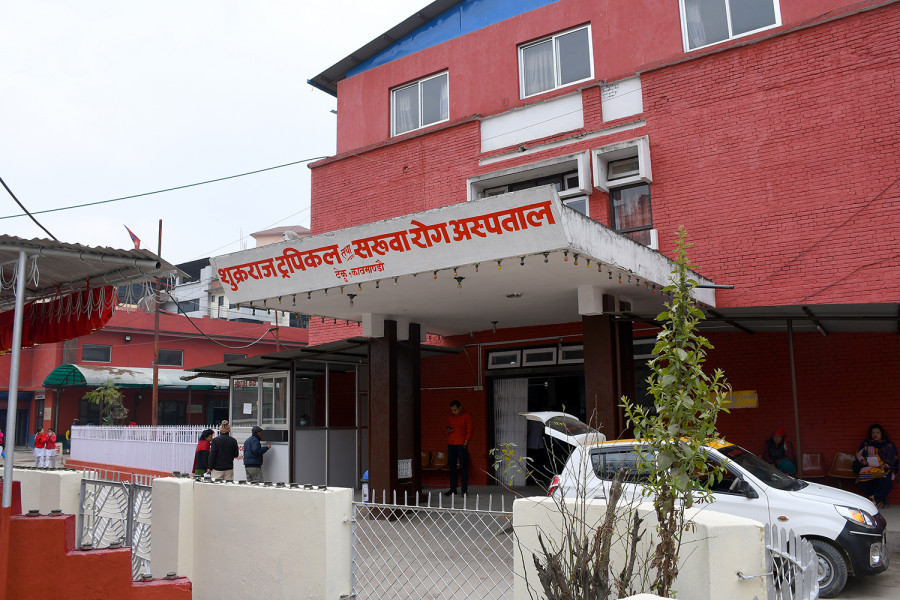Health
Serious Covid-19 patients are not getting hospital beds
To make room for serious patients, the Ministry of Health has decided to discharge patients whose conditions are not severe, but patients are still not getting hospital beds.
Arjun Poudel
At least three Covid-19 patients who were suffering from breathing complications were unable to get beds at the Dhapasi based Grande International Hospital in Kathmandu on Sunday, even after waiting for more than 12hours.
“There were over one dozen seriously ill patients waiting at the hospital's emergency from Saturday,” Dr Ajay Thapa, chief of the Emergency Department at the Hospital, told the Post. “We adjusted a few in our own hospital, referred some to other hospitals, but could not arrange beds for the three patients.”
Doctors say mortality rate will increase, if patients are not transferred to wards within four hours from emergency. Patients do not get proper attention from the health workers deployed in the emergency, as they have to attend more patients simultaneously.
“We asked the patients to go to other health facilities, but they did not know where to go,” said Thapa, who is also the chairman of Nepalese Society of Emergency Physicians. “All those waiting for beds in the emergency ward are serious patients, who are suffering from pneumonia and other illnesses.”
Thapa said doctors will be forced to place three to four patients in a single bed because there were not enough beds for Covid-19 patients
With an exponential rise in coronavirus cases, especially in Kathmandu Valley, health facilities designated for the treatment of Covid-19 have been overwhelmed.
As a result seriously ailing patients who are forced to wait to get hospital admittance are compelled to stay at home.
As of Sunday, 132,246 people throughout the country have tested positive for Covid-19 while the number of fatalities has reached 739.
In the last 24 hours, 2,942 people tested positive for the infection, including 1,698 in Kathmandu Valley.
Officials at Sukraraj Tropical and Infectious Disease Hospital, which has been designated for treatment of coronavirus cases since the start of the pandemic, said they have started sending home those patients with less severe conditions. The Ministry of Health and Population has decided to discharge patients with less severe conditions within 10 days.
“On the basis of clinical judgement, we discharge patients without serious conditions within 10 days,” Dr Anup Bastola, spokesperson at the hospital told the Post. “Those who are less serious can afford an oxygen cylinder at home and are also being sent home early.”
According to Dr Bastola, the new measure was taken to lessen pressure at the hospital and to save more lives.
The hospital has also arranged oxygen supply in the isolation ward for those suffering from decline in the oxygen supply.
“Lack of beds is more a managerial problem than the technical,” Bastola said. “We should ensure oxygen supply and monitoring even if we could not arrange more intensive care unit beds and ventilators. Oxygen supply facilities are available in all hospitals and even in medical colleges.”
According to Bastola, all patients whose oxygen level decreases do not need intensive care and supply of high flow oxygen could save their lives.
Last week, the Health Ministry decided to convertall 13 state-run hospitals in Kathmandu Valley in Covid-19 focussed hospitals after the number of new cases started to spike. Despite the new decision, seriously ailing patients are not getting any respite, as the decision is yet to be implemented .
Hospitals, however, said that converting all hospitals into Covid-19 special hospitals is not feasible, as health workers must also look after the patients suffering from other ailments.
The Health Ministry has projected that an additional 320,000 people will be infected with Covid-19 in the worst case scenario in the next four months. The internal projection of the ministry estimates that at least 148,000 additional people will get infected in the next four months.
The World Health Organization has said that 80 percent of Covid-19 infections are mild or asymptomatic, 15 percent are severe infections requiring oxygen and five percent are critical infections requiring ventilators.
Even if the number of new cases will be limited as per the estimation, over 52,000 more infected patients would become serious, if only 15 percent of the projected 320,000 cases require serious treatment and 17,000 patients become critical.
Thapa, chairman of Nepalese Society of Emergency Physicians, said that saving the lives of the health workers was another important task authorities should pay attention to.
“My wife who is a doctor has been hospitalised due to infection for the last 10 days,” said Thapa. “My elder brother and sister-in-law have also been infected. With the rise in infection rate, now there is a challenge to save health workers.”
Meanwhile, the Ministry of Health and Population said that it has been working to extend the capacity of hospitals, increase beds and ventilators.
“Yes, we know seriously ailing patients are in much trouble due to lack of beds in hospitals,” Mahendra Prasad Shrestha, chief specialist at the Health Ministry, told the Post. “We are working to increase the overall capacity of the hospitals, beds, intensive care units, ventilators and oxygen supply and other facilities.”




 9.7°C Kathmandu
9.7°C Kathmandu















